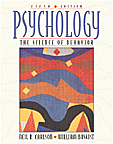![[the epicenter]](../../../../banner.gif)
![[the epicenter]](../../../../banner.gif)
![]()

Age Range: Adult
Authors: Neil R. Carlson, University of Massachusetts, Amherst; and William
Buskist, Auburn University
Publication Date: 1997
Number of Pages: 683
ISBN: 0-205-19345-5
Cost: $65.00 Cloth
Publisher: Allyn and Bacon, Inc.
Phone:1-800-666-9433
Publisher's Description:
The fifth edition of Carlson and Buskist's Psychology: The Science of Behavior reflects a careful revision that continues to treat the discipline as an experimental and natural science. The addition of co-author William Buskist in the fifth edition has strengthened one of the book's major themes, that behavior can best be understood in the context of its adaptive significance. It continues to combine a scholarly survey of research with applications of research results to problems that confront us today. Using the discovery method to take students inside the research process, Carlson and Buskist foster a critical understanding of the logic and significance behind experimental findings. This is featured prominently in special sections, "Evaluating Scientific Issues." The new edition also offers new and improved pedagogy, including a chapter preview and thought questions that follow each interim summary. Finally, it offers a new organization that emphasizes the biological underpinnings of behavior and continues to display a clarity of writing, level of scholarship, and quality of illustration that is unparalleled in the market.
Features
Emphasizes psychology as a science, teaching students to learn and apply the scientific method and to appreciate what the work of the scientist is really like.
Provides a well-organized and lively exposition of the materials, carefully paced to anticipate and answer students' questions, while maintaining a scholarly approach. The authors do not avoid or oversimplify complex issues, while speaking directly to students.
Includes "Interim Summaries," a recognized feature of all Carlson's books, which follow every major section of the text; highlighted by the design, they break down the text into manageable segments or "chunks" and facilitate student review.
Integrates "Evaluating Scientific Issues" essays (one per chapter) that highlight the scientific approach to critical thinking. These essays present and evaluate timely issues, usually stated in the form of an assertion, with supporting evidence. The evidence is critically evaluated and contradictory evidence is presented, with a final (sometimes tentative) conclusion. Examples include: genetics of alcoholism, self-help tapes, hypnosis and criminal investigation.
Presents opening vignettes to illustrate issues relevant to the subject matter of a chapter, including neurological or behavioral disorders.
Current research throughout, including over 250 new references.
Expanded Annotated Instructor's Edition prepared by the authors along with a complete and separate instructor's resource manual.
New To This Edition
New Chapter 3: "Evolution, Heredity, and Behavior" provides expanded coverage of the role of natural selection and evolution in human behavior. Includes new topics such as behavior genetics and evolutionary psychology.
New full chapter on language provides expanded coverage including neurological bases and mechanisms involved in language comprehension and acquisition.
New chapter on health psychology presents the latest coverage on lifestyle, health choices and consequences, stress and health, happiness, and longevity.
Expanded coverage of cognitive and social psychological concepts throughout.
New "Biology and Culture" essays highlight the powerful interplay of biology (evolution, genetics, and physiology) and culture (learning, experience, and socialization). These sections highlight and serve as starting points for discussing important cross-cultural and multicultural issues and practices. Examples include: thinking critically about ethnocentrism, the deaf community, cultural contexts for remembering, and cultural differences in the definition of intelligence.
New chapter previews begin each chapter and give students a survey of what the chapter discusses. Designed to engage students' interest, much like a movie sneak preview, these surveys clearly present the scope of the chapter.
New thought questions follow each interim summary. These questions stimulate critical thinking and entice students to apply what they have learned to familiar, everyday issues.
New marginal running glossary emphasizes the definitions of key terms for students while they read the text.
Table of contents has been thoroughly reorganized to reflect contemporary preferences about order of classroom presentation.
Expanded instructor's resource manual prepared by the authors.
Practice tests are available.
Table of Contents
1. The Science of Psychology.
What Is Psychology?
The Rise of Psychology as a Science.
Major Trends in the Development of Psychology.
2. The Ways and Means of Psychology.
The Scientific Method in Psychology.
Ethics.
Understanding Research Results.
3. Evolution, Heredity, and Behavior.
The Development of Evolutionary Theory.
Natural Selection and Evolution.
Heredity And Genetics.
Sociobiology.
4. Biology of Behavior.
The Brain and Its Components.
Study of the Brain.
Control of Behavior.
Control of Internal Functions and Automatic Behavior.
Drugs and Behavior.
5. Learning and Behavior.
Habituation.
Classical Conditioning.
Operant Conditioning.
Conditioning of Complex Behaviors.
6. Sensation.
Sensory Processing.
Vision.
Audition.
Gustation.
Olfaction.
The Somatosenses.
7. Perception.
Brain Mechanisms of Visual Perception.
Perception of Form.
8. Memory.
Sensory Memory.
Short Term or Working Memory.
Learning and Encoding in Long-Term Memory.
Organization of Long-Term Memory.
Remembering.
9. Consciousness.
Consciousness as a Social Phenomenon.
Selective Attention.
Consciousness and the Brain.
Hypnosis.
Sleep.
10. Language.
Speech and Comprehension.
Reading.
Language Acquisition by Children.
11. Intelligence and Thinking.
Theories of Intelligence.
Intelligence Testing.
The Roles of Heredity and Environment.
Thinking.
12. Lifespan Development.
Prenatal Development.
Physical and Perceptual Development in Infancy and Childhood.
Cognitive Development in Childhood.
Social Development in Childhood.
Development of Gender Roles.
Moral Development.
Adolescence.
Adulthood and Old Age.
For further information, click here
We hope you found what you needed on this page. If you have
any questions or comments, please contact me.
![]()
Howard J. Bender, Ph.D.
President
The Education Process Improvement Center, Inc.
P.O. Box 186
Riverdale, Maryland 20738
hjbender@epicent.com